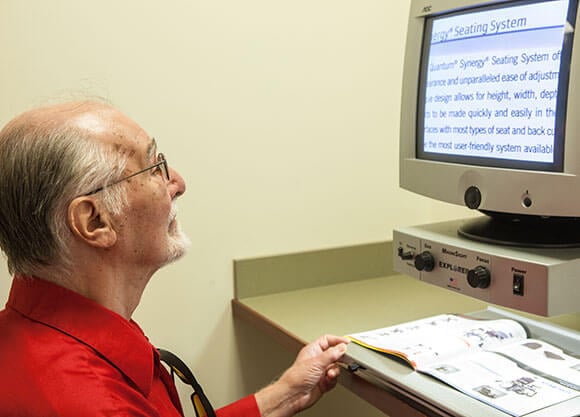
Bringing light to individuals with low vision
October 04, 2021

October 04, 2021

Low vision individuals maintain sight loss that can’t be corrected by glasses, contacts or surgery. Oftentimes senior citizens, many people with low vision also endure depression and anxiety issues, said Professor of Occupational Therapy Catherine Meriano, JD, MHS, OTR/L.
Local doctors recommend the center to patients that may benefit from the services. The therapy usually begins in the parking lot, as staff will escort their patients from their cars. Once inside, occupational therapists begin the process of identifying opportunities for improvement in the patients’ routines.
“We help them think about their everyday tasks. We talk about their environment, focusing on lighting and glare,” said Meriano.
Staff will then identify objects to help. Tools vary from magnification items to talking objects, such as clocks and watches. Strong lighting fixtures are frequently sent home with patients.
Closed circuit televisions are available for individuals with less vision. Similar to a microfiche, users look into a monitor that enlarges objects and reflects them onto a screen. Individuals are then able to look at pictures, as well as read mail, books and more, said Meriano.
The Lions’ Club provides funding for all objects used in the center.
Social work plays an intrinsic role in the center’s mission to holistically serve clients. Support groups are returning to the center post-COVID crisis, said Meriano. For now, patients can participate in one-on-one sessions with Clinical Assistant Professor of Social Work Laura Mutrie, MSW, LCSW.
The center provides a wonderful learning opportunity for occupational therapy and social workers as well. Undergrad volunteers act as runners for faculty, gathering needed objects from the occupational therapy department. Graduate students focused on social work can observe patients and ask questions. They are also able to host one-on-one sessions with clients, said Meriano.
The center’s continued success is apparent in the improved quality of life for patients, said Meriano. She recalls a low-vision individual whose mental health had taken a turn for the worse after entering into an assisted living facility. The woman eventually found camaraderie in the center’s support group, and a simple tool that led to friends in her new home.
“She hadn’t gelled to anyone in the home yet. But, the large print bingo cards we supplied her made her the belle of the ball,” said Meriano. “It’s what turned the corner for her. She has many friends now, and is settled in. It’s so rewarding to experience.”
Quinnipiac Today is your source for what's happening throughout #BobcatNation. Sign up for our weekly email newsletter to be among the first to know about news, events and members of our Bobcat family who are making a positive difference in our world.
Sign Up Now